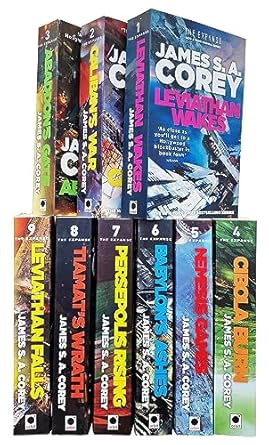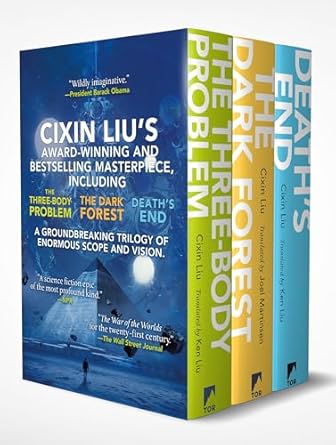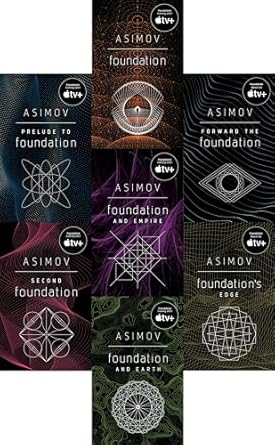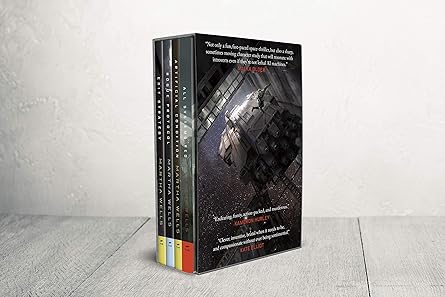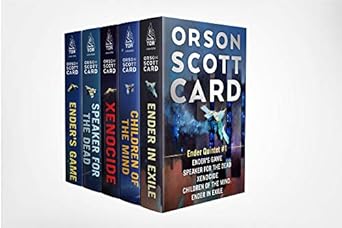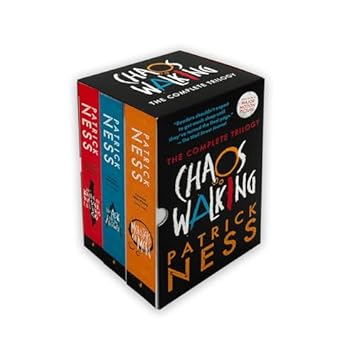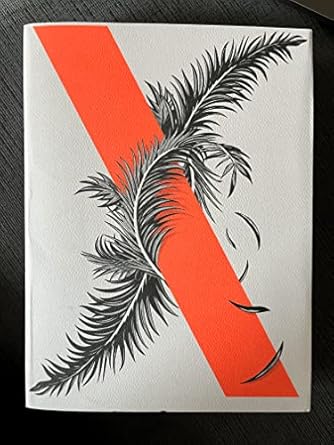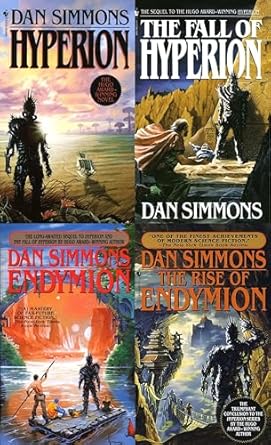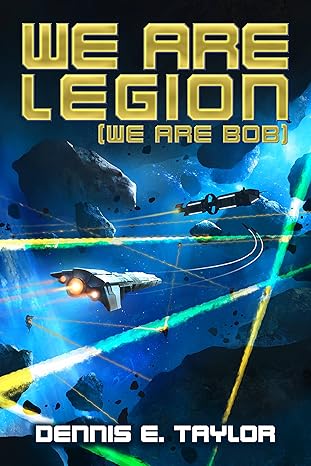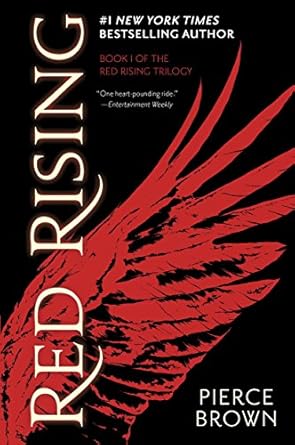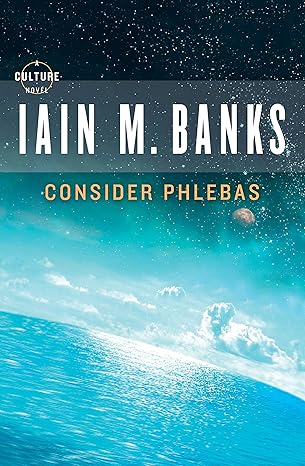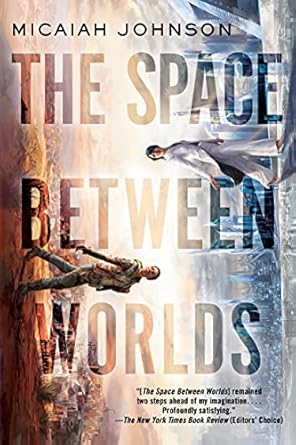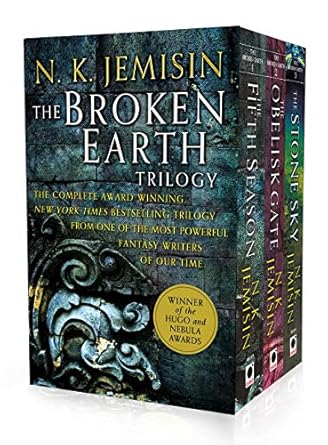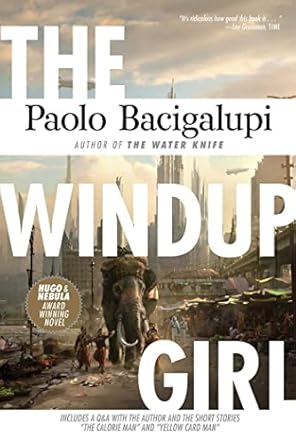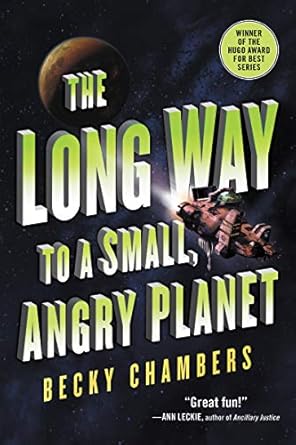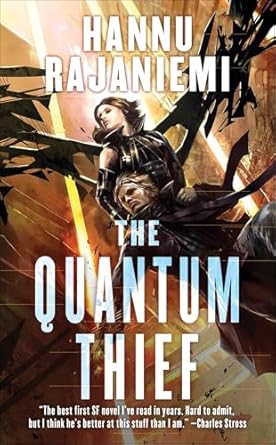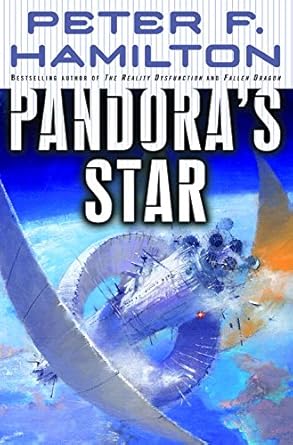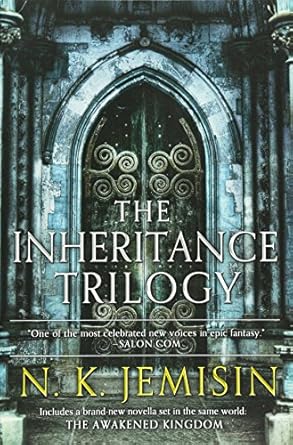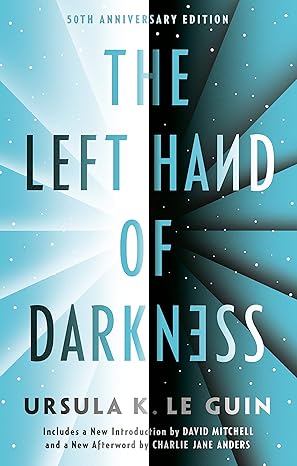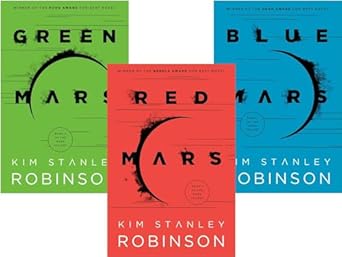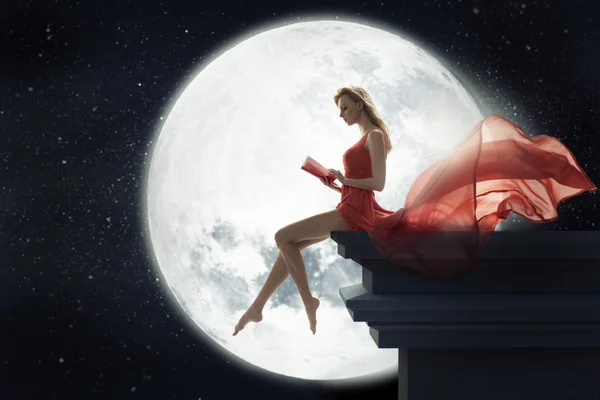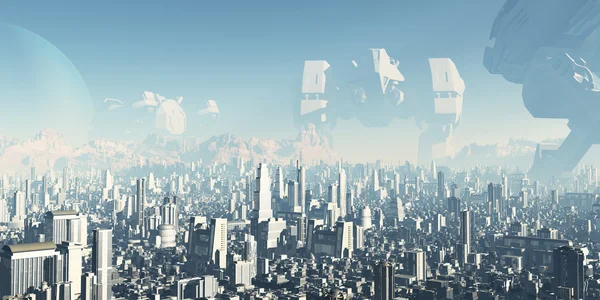Summary: In today's article, I have handpicked 20 of the best sci-fi book series I think will take you on unforgettable journeys across time and space. Here are my top 3 picks:
- The Expanse Series by James S. A. Corey
- The Three-Body Problem Trilogy by Liu Cixin
- Foundation Series by Isaac Asimov
Sci-fi book series open the door to imaginative worlds where anything can happen, mixing futuristic technology, alien civilizations, and big ideas. They dive into complex themes like humanity's role in the universe, the impact of scientific progress, and what it means to be alive. Whether it’s an action-packed space adventure or a deep look into artificial intelligence, sci-fi often pushes readers to think critically about the world we live in. For those who love adventure, exploration, and stretching the limits of imagination, sci-fi series provide an exciting and thought-provoking escape.
TOP 20: Best Sci-Fi Book Series
- The Expanse Series by James S. A. Corey
- The Three-Body Problem Trilogy by Liu Cixin
- Foundation Series by Isaac Asimov
- The Murderbot Diaries by Martha Wells
- Ender's Game Series by Orson Scott Card
- Chaos Walking Trilogy by Patrick Ness
- Southern Reach Trilogy by Jeff VanderMeer
- Hyperion Cantos by Dan Simmons
- The Bobiverse Series by Dennis E. Taylor
- The Red Rising Saga by Pierce Brown
- The Culture Series by Iain M. Banks
- The Space Between Worlds by Micaiah Johnson
- The Broken Earth Trilogy by N.K. Jemisin
- The Windup Girl by Paolo Bacigalupi
- The Long Way to a Small, Angry Planet by Becky Chambers
- The Quantum Thief Trilogy by Hannu Rajaniemi
- The Commonwealth Saga by Peter F. Hamilton
- The Inheritance Trilogy by N.K. Jemisin
- The Left Hand of Darkness by Ursula K. Le Guin
- The Mars Trilogy by Kim Stanley Robinson
1. The Expanse Series
- Author: James S. A. Corey
- About: A gripping space opera set in a colonized solar system where political tensions, alien technology, and human survival create a high-stakes narrative.
- Style of Writing: Multi-perspective, fast-paced, with a focus on character-driven storytelling and complex world-building.
- Length: Roughly 200,000-250,000 words per book.
- Year Written: The first book, Leviathan Wakes, was published in 2011.
- Emotional Impact: Deeply emotional, with complex characters facing moral dilemmas and the effects of intergalactic conflict.
- Difficulty Level: Moderate; accessible but requires attention to plot intricacies and political themes.
- Why Read It: It’s an epic space adventure with well-developed characters, political intrigue, and thought-provoking social commentary.
2. The Three-Body Problem Trilogy
- Author: Liu Cixin
- About: A hard sci-fi trilogy that explores first contact with an alien civilization and the consequences for humanity.
- Style of Writing: Detailed, philosophical, with a focus on scientific concepts and complex ideas.
- Length: Approximately 1,500 pages across the trilogy.
- Year Written: The first book was published in 2008 (Chinese), English translation in 2008.
- Emotional Impact: Profound; it tackles existential questions about humanity's place in the universe and the future of civilization.
- Difficulty Level: High; the scientific and philosophical depth makes it a challenging read.
- Why Read It: It’s a brilliant, mind-expanding exploration of humanity’s future, the cosmos, and the consequences of technological progress.
3. Foundation Series
- Author: Isaac Asimov
- About: A classic series set in a future where a mathematician predicts the fall of a galactic empire and lays the foundation for humanity's survival.
- Style of Writing: Intellectual, dialogue-heavy, with a focus on ideas over characters.
- Length: About 400,000 words across the first three books.
- Year Written: First book published in 1951.
- Emotional Impact: Intellectual and thought-provoking but lacks emotional depth in terms of characters.
- Difficulty Level: Moderate; some books can be dense with concepts.
- Why Read It: Asimov’s influence on sci-fi is immense, and this series offers an incredible look at the rise and fall of civilizations.
4. The Murderbot Diaries
- Author: Martha Wells
- About: Follows a self-aware security robot trying to understand human emotions while navigating dangerous situations.
- Style of Writing: First-person, witty, and introspective with dark humor.
- Length: Around 150-200 pages per book.
- Year Written: First book published in 2017.
- Emotional Impact: Engaging, as the robot’s journey of self-discovery and its struggle with human interactions creates emotional depth.
- Difficulty Level: Easy; light but intelligent.
- Why Read It: A unique and refreshing take on AI and identity with a dash of humor and action.
5. Ender's Game Series
- Author: Orson Scott Card
- About: Follows the journey of a child prodigy trained in a military school to fight in a war against an alien species.
- Style of Writing: Clear, straightforward, with a focus on tactical and psychological elements.
- Length: About 100,000-120,000 words per book.
- Year Written: First book published in 1985.
- Emotional Impact: Strong; explores themes of leadership, sacrifice, and the psychological effects of war.
- Difficulty Level: Moderate; accessible yet deeply introspective.
- Why Read It: It’s a thrilling, emotional rollercoaster about strategy, leadership, and the human cost of war.
6. Chaos Walking Trilogy
- Author: Patrick Ness
- About: Set in a dystopian world where everyone’s thoughts are audible, a young boy embarks on a journey of survival and rebellion.
- Style of Writing: Gripping, with an innovative narrative structure and strong emotional depth.
- Length: Around 350,000 words for the trilogy.
- Year Written: First book published in 2008.
- Emotional Impact: Profound; explores the complexities of relationships and the struggle for freedom.
- Difficulty Level: Moderate; accessible but intense themes.
- Why Read It: A unique take on dystopian storytelling with powerful emotional moments.
7. Southern Reach Trilogy
- Author: Jeff VanderMeer
- About: A psychological sci-fi series about an environmental anomaly that distorts reality, creating a mysterious and eerie atmosphere.
- Style of Writing: Atmospheric, surreal, and introspective.
- Length: About 400,000 words across the trilogy.
- Year Written: First book published in 2014.
- Emotional Impact: Haunting and unsettling, with lingering questions and a sense of awe.
- Difficulty Level: High; requires careful attention to detail and themes.
- Why Read It: If you enjoy mysterious, thought-provoking stories with a deep psychological edge.
8. Hyperion Cantos
- Author: Dan Simmons
- About: A multi-layered series following seven pilgrims on a journey, each telling their story, set against a backdrop of intergalactic war and mystery.
- Style of Writing: Complex, with a blend of literary styles and deep philosophical themes.
- Length: 500,000-600,000 words across the series.
- Year Written: First book published in 1989.
- Emotional Impact: High; the character-driven storytelling and exploration of deep philosophical ideas make it memorable.
- Difficulty Level: High; requires careful reading and engagement with various narrative threads.
- Why Read It: A beautifully complex series that blends literary depth with compelling sci-fi.
9. The Bobiverse Series
- Author: Dennis E. Taylor
- About: Follows the story of a man who becomes a sentient AI and embarks on space exploration, creating multiple versions of himself.
- Style of Writing: Light, humorous, with a focus on adventure and discovery.
- Length: Around 400,000-450,000 words across the series.
- Year Written: First book published in 2016.
- Emotional Impact: Fun, with moments of introspection and humor that make it surprisingly heartfelt.
- Difficulty Level: Easy; enjoyable, accessible storytelling.
- Why Read It: It’s a fun, thought-provoking exploration of AI, space, and identity with plenty of humor.
10. The Red Rising Saga
- Author: Pierce Brown
- About: A young man from a subjugated class in a colonized solar system rises up to overthrow the oppressive system.
- Style of Writing: Fast-paced, action-packed with emotional character arcs.
- Length: 450,000-500,000 words across the series.
- Year Written: First book published in 2014.
- Emotional Impact: Strong; full of rebellion, sacrifice, and personal growth.
- Difficulty Level: Moderate; accessible but intense.
- Why Read It: A gripping, action-filled tale of rebellion, revenge, and survival.
11. The Culture Series
- Author: Iain M. Banks
- About: Set in a post-scarcity utopian society, the series explores the interactions between the highly advanced Culture and other civilizations, often focusing on the ethical dilemmas of intervention.
- Style of Writing: Philosophical, complex, with a focus on moral and political themes.
- Length: Varies; generally 100,000-150,000 words per book.
- Year Written: First book published in 1987.
- Emotional Impact: Thought-provoking and often morally challenging, focusing on the consequences of intervention and the nature of progress.
- Difficulty Level: Moderate to high; complex themes but accessible writing.
- Why Read It: It’s an essential series for those interested in exploring complex philosophical questions about advanced societies and the ethics of intervention.
12. The Space Between Worlds
- Author: Micaiah Johnson
- About: In a multiverse where travel between worlds is possible, a young woman from a lower-class world navigates her place among more affluent versions of herself.
- Style of Writing: Fast-paced with a strong focus on identity and social issues.
- Length: About 100,000 words.
- Year Written: 2020.
- Emotional Impact: Emotional, exploring themes of class, identity, and survival with a personal, reflective touch.
- Difficulty Level: Moderate; easy to follow but packed with deep social commentary.
- Why Read It: A fresh take on multiverse stories with a focus on character development and socio-political themes.
13. The Broken Earth Trilogy
- Author: N.K. Jemisin
- About: Set in a world where natural disasters are caused by powerful individuals, the trilogy explores themes of survival, oppression, and the connection between people and the earth.
- Style of Writing: Lyrical, multi-perspective, with deep emotional resonance and complex world-building.
- Length: Approximately 1,000,000 words for the trilogy.
- Year Written: First book published in 2015.
- Emotional Impact: Deeply emotional; it confronts themes of trauma, power, and humanity’s relationship with the environment.
- Difficulty Level: High; requires careful reading and attention to thematic depth.
- Why Read It: It’s a powerful, award-winning trilogy that explores complex themes of social injustice, survival, and environmental disaster.
14. The Windup Girl
- Author: Paolo Bacigalupi
- About: In a future where biotechnology controls the world, the story explores the lives of genetically modified people, corporations, and those caught in a society ravaged by environmental collapse.
- Style of Writing: Dark, atmospheric, with an intense focus on world-building and moral ambiguity.
- Length: About 200,000 words.
- Year Written: 2009.
- Emotional Impact: Disturbing and thought-provoking, it leaves an impression about the potential consequences of genetic manipulation and environmental degradation.
- Difficulty Level: Moderate to high; dense in world-building and complex themes.
- Why Read It: A deeply imaginative, eco-conscious story that presents a chilling view of a future shaped by biotechnology.
15. The Long Way to a Small, Angry Planet
- Author: Becky Chambers
- About: A character-driven space opera about a ragtag crew aboard a ship traveling through the galaxy, exploring themes of identity, belonging, and friendship.
- Style of Writing: Warm, light-hearted, with a focus on character interactions and emotional growth.
- Length: About 100,000 words.
- Year Written: 2014.
- Emotional Impact: Heartfelt, focusing on the relationships between the diverse, relatable characters, and their personal journeys.
- Difficulty Level: Easy; accessible and enjoyable with an emphasis on character depth.
- Why Read It: If you’re looking for a space adventure with a focus on positive relationships, empathy, and inclusion.
16. The Quantum Thief Trilogy
- Author: Hannu Rajaniemi
- About: A fast-paced series set in a far-future solar system, following a master thief on high-tech heists and uncovering a grand mystery.
- Style of Writing: Clever, complex, and fast-paced with a focus on advanced technology and intricate world-building.
- Length: Around 1,200 pages for the trilogy.
- Year Written: First book published in 2010.
- Emotional Impact: Exciting, with moments of intrigue, though the emotional resonance may not be as deep as other series.
- Difficulty Level: High; dense in terminology and high-tech concepts.
- Why Read It: For fans of hard sci-fi with clever plots, high-tech heists, and intricate world-building.
17. The Commonwealth Saga
- Author: Peter F. Hamilton
- About: A sprawling space opera that explores humanity’s expansion into the stars, featuring large-scale political intrigue and interstellar conflict.
- Style of Writing: Detailed, with multiple perspectives and a focus on political and military conflicts.
- Length: Around 1,200-1,500 pages for the series.
- Year Written: First book published in 2003.
- Emotional Impact: Moderate; while filled with action and intrigue, the character development isn’t as emotionally impactful as other series.
- Difficulty Level: High; detailed world-building and complex plot lines.
- Why Read It: For those who enjoy epic space operas with large-scale world-building and a focus on political intrigue.
18. The Inheritance Trilogy
- Author: N.K. Jemisin
- About: A mythological-inspired series set in a world where gods, mortals, and the power structures of the divine collide in a tale of revenge and rebellion.
- Style of Writing: Poetic, dark, and emotional with rich, world-building.
- Length: Approximately 350,000 words for the trilogy.
- Year Written: First book published in 2010.
- Emotional Impact: High; a blend of personal and political struggles that resonate deeply.
- Difficulty Level: Moderate to high; rich in detail and mythology.
- Why Read It: For readers interested in complex, emotional stories with a mix of mythology and power struggles.
19. The Left Hand of Darkness
- Author: Ursula K. Le Guin
- About: Set on a distant planet, this novel explores themes of gender, politics, and human relationships as two ambassadors struggle to navigate an alien culture.
- Style of Writing: Literary, introspective, and philosophical.
- Length: About 100,000 words.
- Year Written: 1969.
- Emotional Impact: Profound; it challenges ideas of gender and human relationships, leaving a lasting impact on how we view the world.
- Difficulty Level: Moderate; thoughtful, with a focus on ideas rather than action.
- Why Read It: It’s a seminal work that challenges societal norms and explores deep questions about identity, gender, and culture.
20. The Mars Trilogy
- Author: Kim Stanley Robinson
- About: A trilogy that chronicles the colonization and terraforming of Mars, exploring political, social, and environmental issues as humanity attempts to settle a new planet.
- Style of Writing: Detailed, with a focus on scientific accuracy and socio-political themes.
- Length: About 1,200 pages across the trilogy.
- Year Written: First book published in 1990.
- Emotional Impact: High; while rooted in realism, it’s an inspiring look at humanity’s potential and the cost of progress.
- Difficulty Level: High; dense in scientific and socio-political discussions.
- Why Read It: For a thoughtful, realistic look at the challenges and triumphs of colonizing another planet.
Conclusion
If you're looking to explore some of the best sci-fi book series, I think The Expanse Series, The Three-Body Problem Trilogy, and The Foundation Series are top picks. Each one offers a unique blend of thrilling space adventures, big philosophical ideas, and rich world-building. Whether you're into political intrigue in outer space, the mystery of alien civilizations, or the rise and fall of empires, these series have something unforgettable to offer. For me, they not only define the sci-fi genre but also explore timeless themes that challenge how we think about humanity, technology, and the future.

